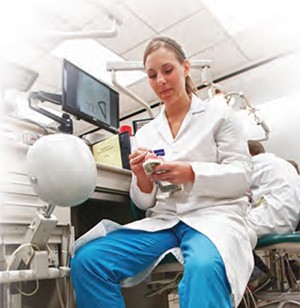
Professor Luke Shaefer is delighted to collaborate with the University of Michigan (UM SOD) and the University of Detroit Mercy (UDM SOD) schools of dentistry to examine the possibility of creating a pilot program at each school to train registered dental hygienists to provide an expanded scope of practice that includes limited restorative care (teeth fillings) and apply the social work skills needed to work with vulnerable populations.
Working with SSW, each dental school has assembled a feasibility committee that is focusing on defining the scope of practice, determining curricular needs, clinical skills, costs and capacity (the number of students that each program can accommodate); and evaluating outcomes and the impact on access to care. This marks an uncommon collaboration between social work and dentistry.
“Oral disease affects millions, disproportionately impacting those in poverty, the elderly, and children,” Shaefer explained. “Collaboration isn’t always totally comfortable, but it’s the responsibility of social workers to push the interests of vulnerable and underserved populations and try to move them higher up on the agendas of all professional communities.”
“My role has been to try to be a catalyst that brings people together. My only agenda is to explore what can be done to improve access to care for vulnerable populations in a rigorous way,” Shaefer said.
“Building understanding across diverse stakeholders is critical for any collaboration. It’s important to understand that everyone has different perspectives, interests, and priorities, so helping stakeholders communicate with each other and finding the common ground across them is the key,” Shaefer said.
The process of finding common ground has been in motion for some time, and a major milestone was reached in August 2011, when SSW hosted a conference “Increasing Access to Oral Health Care in Michigan: A Discussion of Three Possible Solutions.” The purpose of the conference was to discuss potential solutions for increasing access to oral health care for disadvantaged residents of Michigan. The solutions discussed included: 1) alternative workforce models, 2) increased utilization of existing modes of practice, and 3) collaborations across health care professions. “Because alternative workforce models are the most controversial, they took the lion’s share of the discussion time. But what I really liked about the conference was that it prompted vigorous, but civil debate,” Shaefer said.
Out of this conference came the idea for a pilot project and numerous conversations with the deans and faculty from both schools of dentistry have followed. The collaboration with the schools of dentistry is in the early stages, but the process to make the pilot a reality has been slow and steady.
…it’s the responsibility of social workers to push the interests of vulnerable and underserved populations and try to move them higher up on the agendas of all professional communities.
In an exciting development, the University of Detroit Mercy School of Dentistry has announced they plan to pursue the pilot itself, conditional on funding. They hope to bring in their first class of students in spring of 2013. Shaefer says, “If we are able to move this project from feasibility testing to a pilot program at either school, the coming years of collaboration will result in relationships that will change lives and offer an innovative model for providing oral health care based on a sound curriculum and data to support the impact on access-to-care.
Funding for this study is made possible by a generous grant from the Nokomis Foundation.